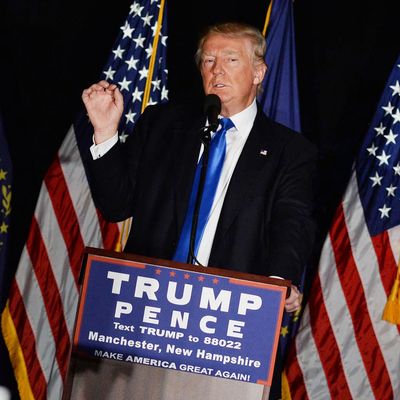
Yesterday, Hillary Clinton delivered a speech tying together Donald Trump’s long history of racism, from his early days excluding African-American tenants from his family’s housing in New York to what Paul Ryan called “textbook racist” comments that a Mexican-American was unfit to judge whether Trump had committed fraud. Trump fired off a peripatetic series of replies. He oddly lambasted Clinton’s speech as “short,” raising the tantalizing question of what further evidence of his racism he believes she should have included. (His racialized hysteria against the “Central Park Five”? His assertions that black people are inherently lazy?) He lambasted Clinton’s use of the racism charge, “the last refuge of the discredited politician,” a cheap trick to which only a scoundrel would resort. Then finally, that evening, forgetting his conviction that only a discredited politician would charge his opponent with racism, Trump appeared on CNN, where he called Clinton a “bigot.”
Two years ago, I wrote a long essay about how race has defined the Obama presidency. Since 2008, white racial victimization has increasingly defined conservative politics. I told the story in a way that was not completely devoid of sympathy to the right. The conservative movement has been afflicted with a dilemma from the beginning of its rise to power within the Republican Party half a century ago: It is intellectually independent of racism yet politically dependent on it. Barry Goldwater was not a racist, and his opposition to the Civil Rights Act grew out of principled anti-statism, but Goldwater’s only natural base of support lay in segregationists.
The standard-issue conservative analysis holds that racism and conservative politics have no relation to each other whatsoever. To the extent that race intersects with political life, conservatives insist, it is the fault of liberals, who use race as a bludgeon to discredit conservatives and manipulate African-Americans. The Obama era has steadily exposed this fallacy, as the power of white racial resentment has grown impossible to deny. Trump has brought the party’s racial dilemma to a head. He has brought into the party tent new, overtly rather than covertly racial politics, which calls itself “alt-right,” which occupies a gray area between traditional, formally race-neutral conservatism and open white supremacy. Steve Bannon, Trump’s campaign manager, boasted in July (when he was still running the pro-Trump Breitbart), “We’re the platform for the alt-right.” Trump has not made the GOP a white-supremacist party, he has simply nudged it further along that spectrum.
Trump has forced conservatives to either accept this evolutionary step toward its white-identity constituency, or fight it. The movement’s elite has split on this question. On the one hand, conservatives like Avik Roy have conceded that their movement has resided in a state of denial about its reliance on racist votes. “Conservative intellectuals, and conservative politicians, have been in kind of a bubble,” Roy told Zack Beauchamp. “We’ve had this view that the voters were with us on conservatism — philosophical, economic conservatism. In reality, the gravitational center of the Republican Party is white nationalism.” The Federalist’s D.C. McAllister responds that white racists are actually few and far between, and that conservativism merely appeals to “the resentment of a culturally delegitimized group whose beliefs, principles, and values have been stigmatized with the racism label.”
National Review’s Jonah Goldberg argues that the conservative movement has to fully shun the alt-right. Conservative talk-show host Hugh Hewitt (who tried to undermine Trump during the primaries, but has supported him on partisan grounds after he won the nomination) has argued for compromise:
Republican leaders Paul Ryan and Mitch McConnell have ducked questions about Clinton’s denunciation of the alt-right. But the question has already been answered. Party leaders who can accept Trump as their nominee have made a public admission that racism in the Republican coalition is a fact of political life they are willing to live with.






























